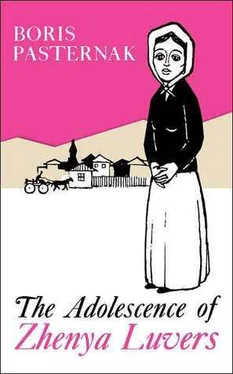New furniture was bought. Luxury came into the house. The Luvers bought a coach and kept horses. The coachman’s name was Davlecha. Rubber-tired wheels were quite a novelty at the time. When they went for a ride, everything turned and stared after the coach: people, fences, chapels and roosters.
When the coach, out of respect for Mrs. Luvers, started off at a walking speed, she shouted after them: “Don’t go too far, only to the turnpike and back. And look out when you go down the mountain!” The pale sun, which reached her on the doctor’s veranda, glided further along the street, till it reached the nape of Davlecha’s freckled neck and warmed him so that his skin contracted pleasantly.
They drove over the bridge. The conversation of the planks sang out, cunning, full and clear; it was fixed for all time, forever locked in the chasm below and always in her memory, at noon and in her sleep.
Vykormish stamped up the mountain and tried his strength on the steep, unyielding pavement. He stretched and pulled and heaved; he looked like a wriggling locust and, humbled by his unnatural effort, he suddenly became beautiful, like the creature that by its very nature is meant to jump and fly. It seemed as if he couldn’t bear it any longer, his wings flashed angrily, he soared. Really! The horse pulled in, then threw his forelegs high and dashed in a brief gallop through a fallow field. Davlecha shortened the reins and curbed the horse. A thin, shaggy dog barked at them stupidly. The dust was the color of gunpowder. The road turned sharply to the left.
The black road ended at the fence of a railway warehouse. The air felt restless. The sun came slantingly through the bushes and veiled a group of strange small shapes in feminine clothes. The sun bathed them in a white light which appeared suddenly, pouring like liquid lime from a pail overturned by a shoe and ran like a wave over the ground. Bands of sunlight covered the road. The horse moved at a walking pace.
“Turn left,” Zhenya ordered. “There is no road there,” Davlecha replied and pointed out a red fence with his whip. “A dead end.”
“Then stop. I want to look around.”
“There are our Chinese.”
“Yes, I see.” Davlecha noticed that the young lady no longer wanted to converse with him. He sang out a long-drawn “prrrrrr” and the horse, its whole body shaking, stopped as if it had taken root. Davlecha whistled softly and encouragingly to help the horse do what was necessary.
The Chinese ran across the street, giant loaves of rye bread in their hands. They were dressed in blue and looked like women. Their naked heads were crowned by knots on top, which seemed to be twisted in place by handkerchiefs. Some of them hesitated, and one could study them closely. Their faces were dark with dirt, like copper oxidized by poverty. Davlecha took his tobacco pouch from his pocket and began to roll a cigarette. At that moment several women appeared on the corner toward which the Chinese were moving. Probably they also were going to fetch bread. The Chinese who stood in the road guffawed and walked toward the women. They moved back and forth as if their hands were tied together with ropes. Their rocking motions were emphasized by the fact that from neck to ankles they looked poured into gowns cut like those of acrobats. There was nothing frightening about them, and the women did not run away, but stood there laughing.
“Davlecha, what are you doing?”
“The horse pulls; it doesn’t want to stay here.”
Davlecha beat the horse a few times with the reins, then drew them tight and let them out again. “Quiet! You’ll overturn the coach!”
“Why do you beat him?”
“I have to.”
And only when the sly Tartar was in an open field and the slaying horse had quieted down and, swift as an arrow, had removed his young lady from the shameful scene, did Davlecha take the reins into his right hand and put his tobacco pouch, which he had been holding all the while, back under his coat tails.
They returned by another route. Mrs. Luvers saw them coming, probably from the doctor’s window. She came to the threshold at the very moment when the bridge, which had told them its whole tale, resumed it under the water carrier’s cart.
The entrance examination at the high school brought Zhenya together with a girl called Lisa Defendov, who had picked rowanberries along the way and brought them with her to school. The daughter of a choir leader had to repeat her French exam. Eugenia Luvers was seated in the empty seat next to her. And so they became acquainted as they sat side by side repeating the same sentence: “Est-ce Pierre qui a volé la pomme? Oui, c’est Pierre qui a volé… etc.”
The fact that Zhenya had been tutored at home proved no handicap to the friendship of the girls. They met often. The visits, however, were one-sided, thanks to certain views held by Zhenya’s mother: Lisa could come to see her friend, but Zhenya was forbidden, for the time being, to go to the Defendovs.
The intervals between their meetings did not keep Zhenya from attaching herself quickly to her friend. She loved Defendova—that is to say, she played a passive role in their relationship. She became Lisa’s “pressure gauge,” watchful and easily upset. All of Lisa’s remarks about her classmates, whom Zhenya did not know, roused in her a feeling of impending rage and bitterness. She was depressed and sad. These were the first attacks of jealousy. Without reason, and solely on the basis of her distrust, Zhenya was convinced that Lisa was playing a game with her, that outwardly she made a show of sincerity but privately laughed about everything that marked her as a Luvers, sneering behind Zhenya’s back at school and at home. But Zhenya found that this was the way it had to be, that it was in the nature of her attachment. Her feeling sprang from the powerful desire of an instinct that knows no selfseeking and can do but one thing: suffer for the sake of its idol and burn itself out when it really feels for the first time. Neither Zhenya nor Lisa influenced each other permanently. Zhenya remained Zhenya; Lisa remained Lisa; they met and separated—the one deeply moved, the other completely untouched.
The father of the Akhmedianovs dealt in iron. In the year between the birth of Nazzedin and Smagil he suddenly became rich. Thereafter Smagil was called Samuel and the father decided to give his sons a Russian education. The father overlooked not one peculiarity of the way of life of a “Carin,” a gentleman, and after ten years of eager imitation he had in every respect overshot his goal. The boys did excellently—that is, they adhered strictly to the model their father held up to them, and the brashness of their father’s ambition remained with them, noisy and destructive, so that they were like two circling flywheels left to the mercy of the power of inertia.
In the fourth class the Akhmedianov boys were merely fourth-class pupils. They were made up of broken pieces of chalk, cheating, buckshot, rattling school benches, vulgar swearwords and red-cheeked, snub-nosed selfconfidence. Seryozha befriended them in August. By the end of September the boy no longer had a character of his own. This was in the nature of things. To be a typical high school boy, and the type he later becomes, means to join the camp of the Akhmedianovs. And Seryozha wanted nothing more passionately than to be a typical high school boy. Luvers placed no obstacles in the way of his songs friendships. He noticed no change in the boy, and had he noticed any, he would have ascribed it to adolescence. Besides, he had more serious worries. He had suspected for some time that he suffered from an incurable disease.
She was sad, but not for his sake, although everybody agreed how terribly annoying and awkward it must be. Negarat was too wise even for her parents, and all that the parents felt about foreigners transmitted itself indistinctly to the children, as to spoiled pets. Zhenya was sad only because things were no longer the same, because only three Belgians were left, because there was no longer so much laughter.
Читать дальше










